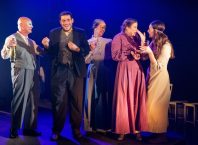The approaching Hannukah season seems to have an endless supply of festivals, with an abundance (or is it excess?) of fanfare that surrounds them, but don’t let the noise drown out the sound of a few truly interesting voices. The Short Theatre Festival, now in its 12th year, will take place at Tzavta from December 23 – 26th. The festival offers an opportunity to experience a variety of different individual voices and perspectives, within a theatrical framework that encourages experimentation and artistic risks.
This year’s program includes two musical productions, a festival first. Shalom Shmuelov, festival founder and artistic director explained that for him the selection process is very much a process: “The reading period is very interesting. I see myself as a dramaturg. The plays as submitted are not quite fully baked, not quite ready for the stage. We begin working on more plays than what will eventually be produced onstage.” Ultimately, out of 130 submissions, 7 plays will make it to the stage.
Shmuelov further explained that in soliciting submissions he prefers not to designate a theme for the festival, but rather to select the most interesting, promising texts for production. Yet, in the process of reading he found that many plays related to incidents of violence, whether expressed or repressed, physical or verbal, hence the festival’s theme: Let’s talk about violence. The plays are up to 30 minutes in length and will be presented in alternating programs consisting of three or four plays each.
The plays:
Hakirat Shinayim (Tooth Investigation) by Ido Setter, directed by Ofer Amram
Based on Harold Pinter’s One for the Road (1984)
An absurd investigative drama. The reason for the interrogation is unknown, the interrogator’s emphasis on oral hygiene bizarre and menacing.
Yaldut (Childhood) by Rachel Shalita, directed by Nelly Amar
A dramatic photo album. A dialogue takes place between a child and an adult, as represented by two actors, a woman and man who remain onstage throughout the play, yet constantly reverse roles as the scene shifts. The audience will have to work hard to keep up, sometimes catching on to the transition in mid-scene. The small and tender aches of childhood, often passing unseen by the surrounding adults, are at the core of this drama: a new baby in the family, moving to a different apartment, a boy who wishes he were a girl.
Ein Kmo Mishpacha (There’s Nothing Like Family)
by Maor Harush, directed by Yoav Michaeli
A comedy about an alternative family. Playwright Harush says of this play, “In Hollywood they crash planes and destroy the world to create interest, I think the most interesting things take place in your living rooms. There isn’t any large looming threat, but family members systematically destroy one another’s lives. [In this play] Tikva (her name means hope in Hebrew) is married to Baruch, a man so ineffective that he is portrayed by a doll in this production.” Add a thirty year old son who is incapable of leaving the nest, and the family portrait is complete.
Haderech Lemata (The Way Down) by Alma Veich Hoshen, directed by Orly Ravinian
A great drama about little people. It’s inventory time in the back room of a shoe store. Rivi the sales clerk is pressed for time and Avi, the slightly slow worker who admires her from afar, are drawn into a power struggle that spins out of control.
Socharim (Merchants) by Amit Erez, directed by Shalom Shmuelov
A detective tragedy. Playwright Erez is playing with language in this drama which centers on the enigmatic “stuff” sold by the merchants, writing in a style which deliberately fractures the syntax of the dialogues, plot and chronology. Berdugo the merchant tells his beloved Bracha: “You are as clean as an electric blanket” – wonder what that “stuff” is he’s selling…
HaJilljull by Yoni Lahav, directed by Tal Brenner
A satiric opera based on Kafka’s Metamorphosis
The title is a take-off on the Hebrew title for Kafka’s tale: The Gillgull, which means metamorphosis, or reincarnation in Hebrew. One morning, Gabi Gadot, high-tech wiz kid, wakes up to discover that he has become…an Arab. Says Lahav: “Kafka wrote about the Jews in Europe and was considered one of the foreshadowers of the Holocaust. Here, we cannot help but make the comparison to the way of relating to the enemy – abstract, distant, monstrous, and living among us.” Brenner added to this comment saying, “This is a satire of the bourgeois left, we are not talking about the right wing’s inability to accept the ‘other’ – we are talking about ourselves, the audience at Tzavta, the bourgeois left who watch gourmet cooking shows on their plasma TVs and eat zucchini fettucini.”
Michal by Michal Hazon, directed by Moria Zarchiya
A Biblical mini-musical. The play is based on the Biblical story of Michal as told in Book II of Samuel. When King David danced before the procession leading the Holy Ark into Jerusalem, his wife, Michal, laughed. Her punishment was harsh – the Bible says that she never bore a child, and does not mention her further. Hazon’s play takes up the story of Michal, twenty years after the incident.
Tickets and information: 03-6950156/7, www.tzavta.co.il
Image credit: Scene from Ha Jilljull/Photo: Elizur Reuveni





